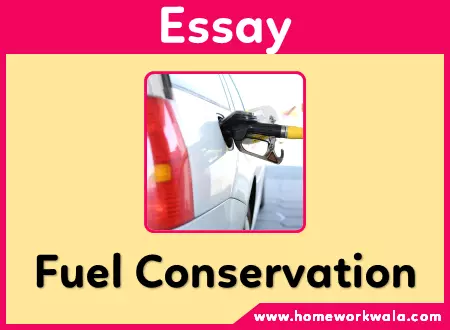Today, In this article we are going to write essay on Fuel Conservation in English in 500 words. This article is about Fuel Conservation.
This post can help the school students who are looking “Fuel Conservation par nibandh English mein”. We briefing about “Fuel Conservation in the English” which is very useful for student.
This essay on “Fuel Conservation” is generally useful for class 7, class 8, class 9 and 10.
[ad1]Table of Content

Simple essay on Fuel Conservation in English
Introduction
Sustainable living includes fuel conservation as an essential component. As we continue to consume fossil fuels, we are not only depleting natural resources, but we are also contributing to environmental pollution and climate change. Therefore, it is essential to adopt measures that promote fuel conservation. In this essay, I will discuss the importance of fuel conservation and provide some practical tips on how to conserve fuel.
[ad2]
Why is Fuel Conservation Important?
Conserving fuel is essential for several reasons. Firstly, fossil fuels are finite resources, meaning that they will eventually run out if we continue to consume them at the current rate. Secondly, burning fossil fuels produces harmful emissions that pollute the air, water, and soil. These emissions can cause health problems such as asthma and lung cancer, and they also contribute to global warming and climate change. Finally, fossil fuels are expensive, and conserving them can help us save money on energy bills.
[ad3]
Tips for Fuel Conservation
- Reduce Consumption: One of the most effective ways to conserve fuel is to reduce consumption. This can be achieved by carpooling, using public transportation, and walking or biking whenever possible. We can reduce traffic congestion and save fuel by decreasing the number of cars on the road.
- Maintain Vehicles: Proper vehicle maintenance can significantly improve fuel efficiency. This comprises of frequently changing oil, rotating tires, and replacing air filters. By keeping our vehicles in good condition, we can reduce fuel consumption and extend the life of our vehicles.
- Drive Efficiently: Fuel efficiency can be improved by driving at a steady speed, avoiding sudden acceleration and braking, and reducing idling time. By adopting efficient driving habits, we can save fuel and reduce emissions.
- Use Energy-Efficient Appliances: Choosing energy-efficient appliances for the home, such as LED light bulbs and Energy Star-rated appliances, can reduce energy consumption and save money on utility bills. By using appliances that consume less energy, we can conserve fuel and reduce our carbon footprint.
- Use Renewable Energy Sources: Investing in renewable energy sources like wind and solar power can reduce reliance on fossil fuels and help to reduce greenhouse gas emissions. By using clean energy sources, we can promote sustainable living and reduce our impact on the environment.
Spread Awareness
Educating others about the importance of fuel conservation and the benefits of reducing energy consumption can help to create a culture of conservation and promote sustainable practices. By raising awareness about the importance of fuel conservation, we can encourage others to adopt sustainable living practices and reduce their carbon footprint.
The Impact of Fossil Fuel Consumption
This subheading could provide a brief overview of the negative impact of fossil fuel consumption on the environment and the economy, including air and water pollution, climate change, and rising energy costs.
Benefits of Fuel Conservation
This subheading could discuss the many benefits of fuel conservation, such as reducing energy costs, improving air quality, promoting sustainability, and reducing dependence on foreign oil.
Government Policies and Incentives
This subheading could explore the role of government policies and incentives in promoting fuel conservation, such as tax credits for energy-efficient appliances, subsidies for renewable energy, and regulations on vehicle emissions.
Future of Fuel Conservation
This subheading could discuss the potential for future advances in fuel conservation technologies, such as electric and hybrid vehicles, smart homes, and renewable energy storage systems.
Individual Responsibility
This subheading could emphasize the importance of individual responsibility in fuel conservation and discuss ways that individuals can take action to reduce their energy consumption and promote sustainable living practices.
Conclusion
Fuel conservation is essential for reducing the negative impact of fossil fuel consumption on the environment and achieving long-term sustainability. By adopting sustainable living practices and conserving fuel, we can reduce our carbon footprint, save money on energy bills, and promote a cleaner, healthier environment for future generations. We must all take responsibility for our energy consumption and do our part to conserve fuel and protect the planet.
[ad4]
You May Also Like
FAQ
Q. What is fuel conservation?
Ans: Fuel conservation refers to the efficient use of fossil fuels and alternative energy sources to reduce energy consumption and promote sustainability.
Q. Why is fuel conservation important?
Ans: Fuel conservation is important because it can help reduce energy costs, improve air quality, and mitigate the negative impact of fossil fuel consumption on the environment and the economy.
Q. What are some practical tips for fuel conservation?
Ans: Practical tips for fuel conservation include reducing consumption, maintaining vehicles, driving efficiently, using energy-efficient appliances, and investing in renewable energy sources.
Q. What role does the government play in fuel conservation?
Ans: The government can play a significant role in promoting fuel conservation by implementing policies and incentives that encourage the use of renewable energy, energy-efficient technologies, and sustainable living practices.
Q. What is the future of fuel conservation?
Ans: The future of fuel conservation is likely to include advances in technology, such as electric and hybrid vehicles, smart homes, and renewable energy storage systems, as well as increased awareness and adoption of sustainable living practices.
We hope you like this post about essay on Fuel Conservation in English. We are very glad to help the students to do their homework in an effective way. This was a “Fuel Conservation ka essay English mein”. This type of questions generally asked the students in their schools to write essay on Fuel Conservation.